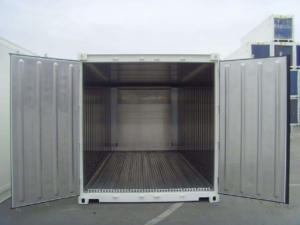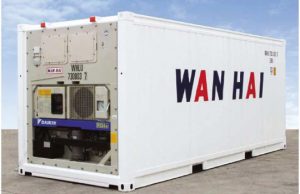Introduction:
In the intricate dance of global trade and transportation, the role of refrigerated containers is nothing short of indispensable. These temperature-controlled marvels ensure that goods ranging from fresh produce to pharmaceuticals reach their destinations in optimal condition. However, with a myriad of options available, the quest for the perfect cold storage container tailored to specific cargo needs can be akin to navigating an icy labyrinth. In this exploration, we unravel the nuances and unveil the key considerations that should guide the selection process, ensuring your cargo sails smoothly through the sea of refrigeration challenges.

Understanding the Cold Chain: A Prelude to Perfection
Before delving into the intricacies of selecting a refrigerated container, it’s imperative to grasp the essence of the cold chain. This complex supply chain process involves the transportation and storage of temperature-sensitive goods under controlled conditions. The success of the cold chain hinges on the meticulous orchestration of various elements, and at its core lies the choice of the right cold storage container.
- Temperature Range and Consistency:
The cardinal rule of cold storage containers is maintaining the desired temperature range consistently. Different cargos have distinct temperature requirements, and selecting a container that can uphold these specifications is paramount. Whether it’s frozen foods demanding sub-zero temperatures or pharmaceuticals requiring a narrow temperature band, understanding your cargo’s thermal needs is the first step in making an informed choice.
- Size Matters:
The size of the refrigerated container is more than just a spatial consideration; it directly influences the efficiency of temperature control. Selecting the appropriate size ensures optimal utilization of space, minimizes energy consumption, and prevents temperature fluctuations. Whether you’re transporting a small batch of specialized pharmaceuticals or a massive shipment of fresh produce, choosing the right size is crucial for both cost-effectiveness and cargo integrity.
- Insulation Prowess:
The insulation capabilities of a cold storage container play a pivotal role in maintaining a stable internal environment. High-quality insulation not only prevents temperature leaks but also contributes to energy efficiency. Exploring the insulation materials used and their effectiveness in different ambient conditions is essential for safeguarding cargo against temperature variations during transit.
- Power Sources and Energy Efficiency:
The energy source powering the refrigeration unit is a critical consideration. While many containers rely on electric power, others utilize alternative sources such as diesel generators. Understanding the energy efficiency of the container and its impact on operational costs is vital. Innovations in sustainable energy options are also influencing the market, offering eco-friendly alternatives for conscientious cargo transport.
- Advanced Monitoring and Control Systems:
In the realm of refrigerated containers, technology is a game-changer. Containers equipped with advanced monitoring and control systems provide real-time data on temperature, humidity, and other critical parameters. This not only facilitates proactive management but also ensures swift response to any deviations from the desired conditions, minimizing the risk of cargo spoilage.
- Multi-Compartment Flexibility:
For those dealing with diverse cargo types, containers with multiple compartments offer unparalleled flexibility. These containers allow different goods to be transported in separate, customizable environments within the same unit. This feature is particularly beneficial for industries dealing with mixed shipments or those requiring varied temperature settings for different products.
Case Studies: Real-World Applications
To illustrate the practical implications of these considerations, let’s explore a couple of real-world scenarios:
- Pharmaceutical Precision:
Scenario: A pharmaceutical company is shipping temperature-sensitive vaccines globally.
Considerations: The company opts for a refrigerated container with precise temperature control capabilities, advanced monitoring systems, and a reliable power source. The container’s insulation is meticulously chosen to withstand various climates, ensuring the vaccines remain potent throughout the journey.
- Fresh Produce Expedition:
Scenario: A farm is exporting a large quantity of fresh fruits to international markets.
Considerations: The farm selects refrigerated containers with ample space, efficient insulation, and a robust power source. Size matters to accommodate the bulk produce, and the container’s ability to maintain a specific temperature range ensures the fruits arrive at their destination in optimal condition.

Emerging Trends in Refrigerated Container Technology
As we traverse the current landscape of cold storage container considerations, it’s essential to cast our gaze toward the future. The dynamic nature of the shipping and logistics industry means continuous innovation and cold storage containers are no exception. Let’s explore some emerging trends that promise to shape the future of temperature-controlled cargo transport.
- Smart Container Integration:
The convergence of the Internet of Things (IoT) and refrigerated container technology is ushering in an era of smart containers. These containers are equipped with sensors and connectivity features that provide real-time data on not just temperature, but also factors like container location, humidity levels, and even potential shocks or vibrations during transit. This level of insight enhances not only monitoring capabilities but also the overall security and integrity of the transported goods.
- Blockchain for Cold Chain Transparency:
Blockchain technology is making its mark in ensuring transparency and traceability within the cold chain. By leveraging blockchain, each step of the cargo’s journey, from production to transportation and delivery, can be securely recorded. This not only aids in quality control but also adds an extra layer of trust and accountability to the entire supply chain.
- Green Refrigeration Solutions:
Environmental sustainability is an increasingly crucial aspect of modern logistics. As a response to this, the industry is witnessing a rise in green refrigeration solutions. This includes the adoption of natural refrigerants with lower environmental impact, as well as the integration of renewable energy sources to power refrigerated containers. These eco-friendly alternatives not only reduce the carbon footprint but also align with the growing demand for sustainable business practices.
- Enhanced Container Insulation Materials:
The quest for better insulation materials continues, with a focus on materials that offer higher thermal resistance and efficiency. Innovations in aerogel technology, phase-change materials, and advanced composite materials are poised to revolutionize container insulation. This evolution ensures that containers can maintain stable temperatures even in the face of extreme external conditions.
- Robotics and Automation in Container Operations:
Automation is permeating various industries, and container operations are no exception. From automated loading and unloading processes to robotic systems that can adjust temperature settings or perform maintenance tasks, the integration of robotics streamlines operations and reduces human error, contributing to overall efficiency and reliability.
Looking Forward: A Refrigerated Horizon
As we contemplate the evolving landscape of refrigerated container technology, it’s evident that the future holds exciting possibilities. The synergy of smart technology, sustainable practices, and innovative materials is reshaping the way we approach temperature-controlled cargo transport. This not only enhances the reliability of these containers but also opens avenues for new industries and markets that demand precision in the cold chain.
Conclusion:
The considerations for selecting a refrigerated container extend beyond the immediate needs of cargo; they also encompass a forward-looking perspective. The integration of cutting-edge technologies and sustainable practices ensures that the cold chain not only meets current demands but is well-positioned for the challenges and opportunities that lie ahead. As businesses and individuals navigate the complex terrain of refrigerated transport, embracing these emerging trends becomes not just a choice but a strategic investment in the future of efficient, reliable, and sustainable cargo logistics.
CIMC Yang Zhou Base is a leading manufacturer of refrigerated containers and various other standard and special logistics equipment. With years of experience in the industry, it focuses on the design, production and distribution of high-quality innovative products that meet the specific needs of customers.
冷蔵コンテナ、コールドチェーン設備、コンテナ型設備統合、モジュール式建物など、高品質で革新的な物流設備が必要な場合、 CIMC Yang Zhou Base はあなたの最良の選択です。世界中のお客様からのお問い合わせを歓迎し、あなたと協力する機会を楽しみにしています。


